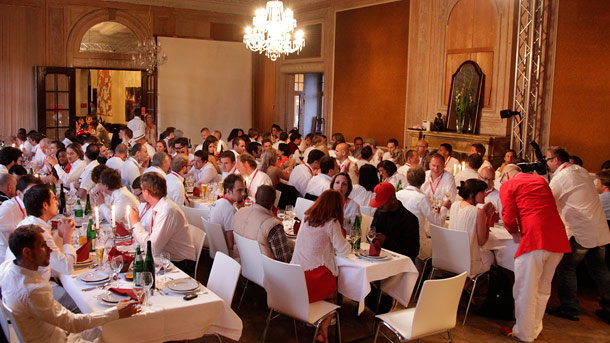The Power of Networks – true added Value or just a Time Killer?

40 million, 850 million – these are impressive numbers if you look at the current amount of new users or users in certain social networks such as Google+ or Facebook. Along with cloud computing, social networks and social media are the words on everyone’s lips in 2012. Another trend is looming on the horizon: “Social Mobile” – the large-scale, mobile use of social media.
Twitter and co. can trigger revolutions and topple regimes. The power of self- organizing networks appears to be unbroken. After politics, social networks – especially when they are used via mobile phones – are gaining a large influence on companies.
The mobile Internet continues to grow quickly and will soon replace stationary Internet. With up to 4 billion mobile communication devices worldwide of which there are 1 billion smart phones, it’s no wonder that over 91 percent of mobile Internet usage is for “socializing”. One third of the 850 million Facebook users surf on the platform with their mobile phones, and 50 percent of the 165 million Twitter users use their mobile phones to tweet. And even YouTube has unbelievable numbers: 200 million views from mobile devices, daily. Especially in today’s age of “ultra connectivity” – permanent connection with the Internet, the importance and relevance of networks and their use with mobile devices is being questioned critically. After all, according to a study by Ericsson, 35 percent of all smart phone users check their e-mails, use Facebook or apps before they even get out of bed.
Social Networking – valuable Benefits or unproductive Waste of Time?
LinkedIn, Xing, Facebook, Google+, StudiVZ or YouTube – to name just a few – all have one thing in common: They enable users to develop networks between each other (also called communities) for mutual support, to improve exchanges of information, to increase productivity or to be a means of support. Even better: The new technological communication structures make it easier to maintain interpersonal relationships. With the help of mobile devices relations can be maintained completely independent of time and location – a revolution in human history that will be a mass phenomenon in the future under the term “social mobile”. But how valuable are these groups and communities in which we and almost all of our clients interact daily, both in the stationary or mobile Internet?
Studies that network researchers have conducted to clarify this question have come to the result that the actual value of a network for a member increases with the size of the network. The growth in value depends on the type or character of the network. When referring to a “broadcast” network such as radio or TV, Sarnoff refers to a linear increase in value. Furthermore Metcalfe points out for transaction networks such as the Internet that the value is growing with the number of people in the network to a quadrant. Reed’s so called law of the pack sets an exponential increase in value for group-forming networks, such as those in social media.
Reed’s Law is of particular interest because it provides information as to which type of activities are particularly valuable and generate a high effect.
Reed identifies basically three value categories that networks can assume:
- linear value: (e.g. contents – images, stories, standard products),
- squared value: (e.g. e-mail, MMS, payment functions),
- and exponential value: (e.g. specialized newsgroups, forums, gossip).
Along with the retrievable “pull” services, controllable “push” functions are becoming more and more prevalent. From this point of view, functionalities such as check in information for all Facebook or Foursquare friends, or the game levels on Farmville or Epic Fighters have very minimal added value for our private and professional development.
Mobile devices add an additional value to social networks since they enable permanent access to available information at any time and at any location. Therefore mobile devices have considerable effects on our social development. Who hasn’t experienced it – someone playing with his smartphone during a conversation. About 51 percent of all adults and even 65 percent of all teenagers admit to using their mobile phones even in the presence of others. Are we forgetting the real world while trying not to lose touch with our virtual worlds?
We live in exciting times, with many opportunities made possible in particular by the mobile phone technologies. This trend will continue. At the end of the day, the use, and the benefits resulting from this, will not be based on the technology but on the individual. In these times of permanent accessibility of everyone and anyone, Marshall McLuhan’s 1966 motto is even more pertinent: “just find the button and turn it off”. But since we keep smart phones on, it is even more important that the smart phone and the software for it – in the form of apps or other software – is equipped with intelligent filter mechanisms so that each individual can escape the flood of information and is able to use the best of the available options.
About the Author
René Bellack,
Vice President Client Services – Telecom Practice Group Germany at The Nielsen Company
 René Bellack is Vice President Client Services – Telecom Practice Group Germany – at Nielsen, a global information and measurement company with leading market positions where he is responsible for driving integrated solutions to be delivered in the telecoms vertical as well as positioning and leveraging Nielsen´s thought leadership in mobile – internally and externally.
René Bellack is Vice President Client Services – Telecom Practice Group Germany – at Nielsen, a global information and measurement company with leading market positions where he is responsible for driving integrated solutions to be delivered in the telecoms vertical as well as positioning and leveraging Nielsen´s thought leadership in mobile – internally and externally.
Prior to joining Nielsen in February 2012 René worked as Vice President Business Development EMEA & General Manager Germany at Out There Media – an international leader in Mobile Advertising – where he has been responsible for expanding the company’s global footprint.
René spent six years at Vodafone, where he looked after marketing for Mobile TV, Gaming and Sports, News & Entertainment services on Vodafone live! before becoming the Head of MediaService & AdManagement for Vodafone MediaSolutions! in 2007.
He holds a degree in Business Economics fromUniversity of Cologne.
An evangelist for all things mobile, René is a frequent speaker and panelist at conferences internationally. He has been a passionate and fierce supporter of MLOVE ever since its 2008 inception, and continues to serve as an advisory board member.
Nielsen Holdings N.V. (NYSE: NLSN) is a global information and measurement company with leading market positions in marketing and consumer information, television and other media measurement, online intelligence, mobile measurement, trade shows and related properties. Nielsen has a presence in approximately 100 countries, with headquarters in New York, USA and Diemen, the Netherlands.




















